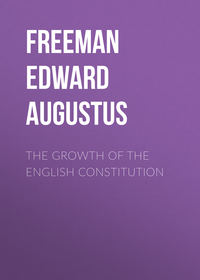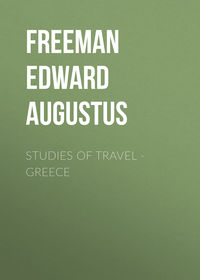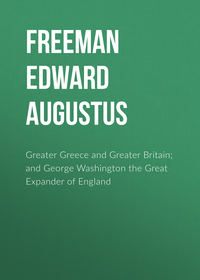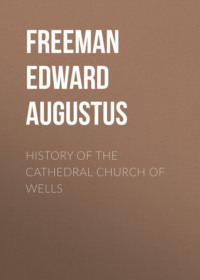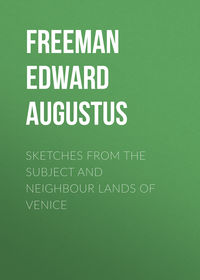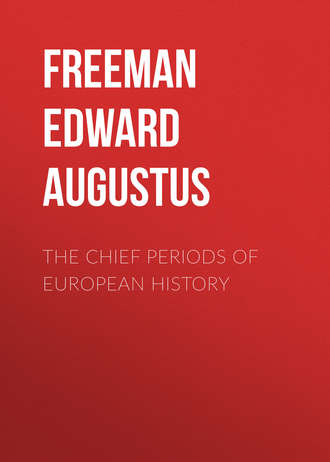 полная версия
полная версияThe Chief Periods of European History
Mighty and wonderful indeed are those the most brilliant days in the long annals of the Eastern Empire. Crete, Cyprus, Kilikia, won back from the misbelievers – the Roman eagle again spreading her wings over the Euphrates and the Tigris – the cross again planted in what might seem to be its special home at Antioch and Edessa – all show the part which the Eastern Rome in her proudest days could play in that Eternal Question which is in truth the very substance of her whole history. Seated at the junction of two worlds, called into being by her founder as the special guardian of Europe and of those lands of Asia which Europe had made her own, as soon as the strife of West and East had changed into a strife of Christendom and Islam, the Eastern Rome was bound to be the foremost in the strife, or she was untrue to the cause of her own being. The Roman of the East, like the Spaniard of the West, was of necessity a crusader before crusades were preached; with both of them religion and patriotism were in truth the same; men could not deal a blow on behalf of their country which was not also a blow dealt on behalf of their faith. We have already glanced at this greatest of all the many instances of Byzantine power of revival, the great days of the Macedonian Emperors. I call back your thoughts to them again in order to carry out more fully the contrast between the East fighting for its very being against the unbelieving foe, fighting under the leadership of its still present Imperial head, and the West where the Imperial head fell away from the common work of all, and left the leadership of the Empire and of the kingdoms of the West to the spiritual power which stood ready to do the highest of his duties for him. When the West first marched for the deliverance of the East, it was not at the bidding of the Cæsar, but at the bidding of the Pontiff. In earlier days, when the danger was at their own gates, when new Attilas came, year after year, on the old errand of havoc, Germany was indeed ready with men to do once more the work of Aetius and the first Theodoric. The Saxon kings, father and son, knew how to smite the Magyar with blows more crushing than the Hun had tholed on the Catalaunian fields. So, ages after, men were not lacking to smite the Mongol at Lignitz as the Hun and the Magyar had been smitten before him. But in these wars men were fighting for their homes and for their lives, for their faith only as part of their homes and of their lives. When the great cry of all came up, when to fight for the faith was not to fight for men’s own homes and lives but for the homes and lives of others, then the voice that spoke was the voice, not of Rome’s Emperor but of her Bishop. Some months back I strove to draw for you a picture of the great day on which that voice was raised, as part of the tale of the memorable land and city that listened to it. By the Bright Mount of the Arvernian land, in the home of Sidonius and Gregory, the word was spoken, at whose bidding men of every calling short of kingship marched forth to do battle for the sepulchre of Christ. The man to speak the word should have been God’s Vicar in earthly things; he who bade men draw the sword should have been he who could bid them follow him as their loftiest leader; the call to the Holy War should have been in the West, as in the East it ever was, a decree that went forth from Cæsar Augustus. But the two swords had clashed in anger, the two lights shone with hostile brilliancy; the days were passed when the third Otto and the fifth Gregory might have stood side by side at such a gathering; he who now drew the sword at the bidding of Rome’s Emperor could do it only at the risk of the ban of Rome’s oft-times banished Bishop. Alexios Komnênos, vigorous founder of a vigorous dynasty, was still not a Heraclius or a Basil; but in the East the Emperor was still ready in his own place to do his own work; he had not vanished into some land beyond Mount Hæmus, and left a Patriarch who acknowledged him not to do the foremost duty of Empire in his stead.
In later stages of the crusading strife Kings and Emperors of the Romans did indeed take their share; and the greatest success won by any crusaders since the first fell to the lot of the Emperor who more than any other drew down on his head the curses of the spiritual Rome. Conrad went and came back; the elder Frederick died on his march; but the second Frederick, alone of Emperors, alone of European kings, made his way within the long-fought-for walls, and wore a royal crown in the city of Godfrey and of David. Cursed first for not going on the crusade, then cursed again for going, cursed most of all for actually winning the prize of so many struggles, the King of Salem had to fall back on traditions older than Godfrey, older than David; he had to fall back on the kingdom of Melchizedek, to place on his own head the crown which no priestly hand would set there. That the Bishop of the Western Rome should strive to hinder the Emperor of the Western Rome from winning the noblest prize that any Emperor since Heraclius had won, shows more than any other tale in history what a power had sprung up in the bosom of the Empire to supplant the Empire itself. A King of France, a King’s son of England, might go on the now hopeless errand; no Emperor, no German king, was likely to go and seek the misbelievers in the Eastern lands with the memory of Frederick before his eyes. A day was to come when the misbelievers were to come and threaten Emperors and German kings in their own realm. But before that day came, one Emperor, fighting for the last fragment of Rome’s Eastern power, was to win by his fall such glory as no Emperor had for ages won by his triumphs. And, even in the moment of that glorious fall, he was doomed to show that the Bishops of the Western Rome could be as deadly in their friendship to the Cæsars of the East as they could be in their enmity to their own sovereigns, whether on the throne of Charles or on the throne of David.
I have already spoken of the event of the year 1204, the taking of Constantinople by the Latins, as the point at which we must place the end of the old and unbroken Empire of Rome in the East. High indeed among the crimes and follies of recorded history must we rank that exploit of princely freebooters in crusading garb which broke in pieces the ancient bulwark of Christendom, and left only feeble fragments which could not fail to be swallowed up one by one by the advancing Infidel. Men with the cross on their shoulders, with their swords hallowed to the service of the faith, turned aside from their calling to carve out realms for themselves at the cost of their fellow-Christians, and thereby to do the work of the misbeliever more thoroughly than he could ever have done it for himself. At the beginning of the thirteenth century the paths of the Eastern and Western Emperors had parted so far asunder that the rival claims of the Greek and the German representatives of Rome might well have died out in oblivion. But the Western Rome had now another representative whose claims could not die out. If her Emperor no longer cared to assert his right to the dominion of the world, her Bishop was ever ready to make the claim. The men of the West were taught to look on the Christian East as a schismatic land to be won back to the true obedience; they were taught that it was a worthy work to drive the pastors of the Eastern Churches from their thrones and to instal in their place dependents of the encroaching Bishop of the West. Vassals of Rome in her new character, a spiritual Prusias, a spiritual Herod, were to teach once more the lesson of bondage to Greece and Asia, to bid all lands look once more to the elder Rome as the judge that alone gave forth judgements which none might gainsay. It is indeed due to the memory of the great Innocent to remember that it was not at his bidding, but in direct disobedience to his straitest command, that Frank and Venetian turned their swords against Constantinople instead of wielding them for Jerusalem. It was not at his word or with his approval that men whose calling it was to rescue the Temple of the Lord from misbelieving masters, defiled the church of the Divine Wisdom as no unbelieving master has ever defiled it. But Innocent did not scruple to take advantage of the crimes which he had forbidden, and to enlarge his spiritual dominion by the help of the plunderers whom he had failed to call off from their work of plunder. And so the disunited East, a Christendom in which Christians had ceased to be brethren, stood a ready prey for the Infidel, strong in his unity, strong in the guidance of the mightiest line of princes to whom the championship of the Asiatic, now the Mussulman, side of the Eternal Question had ever fallen.
For we have reached the days of the Ottoman. Europe and Christendom had now to strive with a foe more terrible than Carthage or than Persia, more terrible than the Saracen of the East or of the West, more terrible than the Hun, the Avar, the Magyar, or the earlier tribes of his own Turkish stock. The Arab had cut the Empire short; but in cutting the Empire short, he had relieved it of provinces which were no source of true strength, and thereby he had given it for the first time somewhat of the life and vigour of a nation. The Seljuk Turk had conquered the lands which the Arab had ravaged but could never conquer; but he had conquered them only by making them a wilderness. He had fixed his throne at Nikaia, but he had fixed it there only to fall back again. If the Sultan of Rome ever dreamed that the Eastern Rome itself was to be his, his dream was of the kind which comes from the gate of ivory. But the vision of Othman was the vision of a seer to whom the future was laid open. He and his house were not to be beaten back till they had reared a dominion on Christian, on European, soil, which far more than outweighed the winning back of the most western land of Europe from Eastern masters. The Ottoman was to become, what no other of the many earlier invaders of his stock had ever become, not the mere passing scourge, but the indwelling and abiding oppressor of Christian and European lands. The Hun and the Avar had been driven back or swept away from the earth. The Bulgarian had bowed himself to Christian teaching; he had cast aside his barbarian speech, and had merged his national being in the national being of an European people. The Magyar had kept his name and his tongue; but he had made his way into the fellowship of Christendom and of Europe; only, to the abiding loss of the nations of South-Eastern Europe, his Christian teaching had come from the Western Rome. The Mongol had fixed himself on a far off march of Europe and Asia, to hold from thence an overlordship over the most distant and least known of European powers. The Ottoman was to do more than these. He was to do what the Arab and the Seljuk had striven in vain to do; he was to fix his seat in the New Rome itself. And more, he was to win the New Rome in the character of an European power, and to storm its walls by the hands of soldiers of European birth. When Mahomet pitched his camp before Constantinople, it was not, like the Saracen who came before him, in the character of a lord of Asia invading Europe; he came as one whose vast dominion on European soil had long hemmed in the Roman world in that corner of Thrace which he had kept as well nigh the last morsel to devour. The conqueror of Constantinople came as one who already ruled on the Danube, but who did not as yet rule on the Nile or the Euphrates. And he came as one who knew how to press into his service the choicest wits and the strongest arms of all the lands from the Danube to the Propontis as well as of the lands from the Propontis to the Halys. The institution of the Janissaries, that cruelest offshoot of the wisdom of the serpent, had turned the strength of every conquered people against itself, and had changed those who should have been the deliverers from oppression into the most trustworthy instruments of the oppressor. The ramparts of Constantinople were stormed by warriors of Greek, of Slavonic, and of Albanian blood; the dominions of the masters of Constantinople were administered by statesmen of European stock, once of Christian faith; whether the human prey kidnapped in childhood or the baser brood who, then as now, sold their souls for barbarian hire. In all the endless phases of the Eternal Question, never had the powers of evil yet devised such a weapon as this, the holding down of nations in bondage by the hands of the choicest of their own flesh and blood.
I would fain ask how many there are among those around me who bear in memory that this day on which we have come together[1] is the anniversary of the darkest day in the history of Christendom. The twenty-ninth of May, the day so long and so strangely honoured among us as the day of the birth and return of Charles the Second, bears about it in other lands the memory of events of greater moment in the history of the world. It is the day of the fall of the Eastern Rome, the martyr’s birthday of her last Emperor. It was on this day that the barbarian first seated himself on the throne of the Cæsars, that the infidel first planted the badge of Antichrist on the most glorious of Christian temples. From this day onwards the Christian East has been in mourning, mourning for the home of its Empire, for the holy place of its faith. On such a day as this there should go up no anthem of rejoicing, but the sad strain of the Hebrew gleeman who had seen a day of no less blackness; “O God, the heathen have come into thine inheritance; thy holy temple have they defiled, and made Jerusalem an heap of stones.” But for the Hebrew seventy years only of sorrow were appointed; our captivity – for the captivity of the Eastern Rome is the captivity of all Christendom – has gone on now for four hundred and two and forty years as it is this day. Now, as then, barbarians sit encamped as a wasting horde in the fairest regions of the earth; now, as then, the profession of the Christian faith entails an abiding martyrdom on nations in their own land. And heavier still is the thought that not a few in Christian lands love to have it so. We daily hear the strange lesson that “British interests,” “imperial interests” – the interest perhaps of the usurer wrung from the life-blood of his victim – demand that we should do all that we can to prolong the rule of the oppressor, to prolong the bondage of the oppressed. We have seen the strange sight of English statesmen rejoicing, as at some worthy exploit of their hands, that they had given back to the rule of the Sultan, that is to the bondage of the unbelieving stranger in their own land, the men, the women, the children, for whom the swords of better men than they had wrought deliverance. With shame like this done in our own day, we can hardly turn round and throw stones even at the men of the Fourth Crusade. They at least sinned for the human motive of their own pelf; it is something for which no human motive can be found when men rejoice in the sorrows of the helpless lands which, after a glimpse of the light of freedom, were again thrust down into the night of bondage which that short glimpse of light has made more black.
Let us remember then, as our story brings the tale of the Eastern Rome to its end, that it was as it were in the night that has just passed that the last Christian worship was paid beneath the dome of Saint Sophia, that it was as it were by the morning light of this very day that the last Constantine took his post by the gate of Saint Rômanos, to die, when to die was all that he could do, for his Empire and for his faith. And yet there is one thought which casts a shadow over the end of the hero and of his power. The last Christian worship beneath the dome of Saint Sophia was a worship paid according to foreign rites, a worship from which the men of the Christian East shrank as from a defilement. So far had the ghostly power of the Western Rome spread its shadow over all lands, that the temporal help of the West could be won only, or rather could be promised only and never won, by treason to the old religious traditions of the East. It was a brighter moment in the memory of our fathers, a moment which has no fellow in our own memory, when three of the great powers of East and West, representing three of the great races of Europe, three of the great divisions of Christendom, Orthodox Russia, Catholic France, Protestant England, fought side by side to break the power of the barbarian on the great day of Navarino.
From the last European survival of the Eastern Rome – for ever remember that a more abiding survival still lingered for a while in Asia – let us turn to another power which we can now look upon as no more than a survival, the last direct survival of the Western Rome. From Constantinople let us turn to Vienna, from the Palaiologos to the Habsburg, from the last Constantine to the first Leopold. For two hundred and thirty years the flood of Ottoman conquest had swept on; it was at last to be stemmed. The Turk appeared, as he had appeared already, before what we must now perchance call the Imperial city of the West. But he fared in another sort from that in which he had fared before the Imperial city of the East. He had made his way into Constantinople; he could not make his way into Vienna. He made his way into Constantinople over the corpse of a slaughtered Emperor; from Vienna he was beaten back, but it was not by the arm of an Emperor that he was beaten back. No king of another land came to the help of Constantine; a king of another land did come to the help of Leopold. Constantine fell by the sword of a foe that was too strong for him; Leopold found a helper who was stronger than his foe, and devoted the full turnings and searchings of an Imperial mind to find out with how little sacrifice of Imperial dignity he could pay some feeble thanks to the man who had saved his throne and life. Vienna was saved for Christendom; it never shared the fate of Belgrade and Buda. But it was the sword of the Slave, the sword of the Pole, that saved it. Look on a hundred years, and the debt is paid in full. Poland is wiped out from the list of nations, and the house that the Pole had saved takes its share of the spoils of its deliverer.
I have ended my tale of Rome, my tale of Rome in her many shapes and stages, in the last feeble survivals of her power, in the more strange survivals of her mere style. Once more I have to meet you before the year, as years in this place are reckoned, comes to its end. As I began by speaking of a world on which Rome had not yet risen, I must end by speaking of a world from which Rome has passed away.
LECTURE VI.
THE WORLD ROMELESS
I said in the opening lecture of this series that one of the most wonderful features of the age in which we live, an age which will assuredly take its place in the Universal History of times to come as one of the most memorable of ages, is that the world is Romeless. I said too that this feature of the most modern times is, by one of the great cycles of history, a feature which takes us back to the earliest days of European life. The world from which Rome has passed away has something in common with the world in which Rome had never shown herself. It has something in common with it which it has not in common with those later ages during which Rome, in one shape or another, under one form of influence or another, was the acknowledged centre of all European and Christian lands. But this is one of those many truths which can be grasped only by those who look at European history as a whole, and who are not led away by the delusive voices which would teach them that this or that fragment of the unbroken tale can be mastered by itself apart from the other acts of the one drama. He who shuts up his books and he who opens his books at any arbitrary point in Rome’s long story are alike shut out from any true conception of the place of Rome in the world’s history; they are shut out from understanding the difference between an age in which Rome is and an age in which Rome is not. To their eyes the fact that the world is Romeless will not seem anything wonderful, anything distinctive, because they have never looked with any searching gaze at the ages in which the world was otherwise. Such an one will never see that the great feature of the most modern times, a feature which has reached its height in the times in which we ourselves live, is the absence of any such centre as the world so long gathered itself around. And if he will not see that the world is Romeless, still less will he see that even the Romeless world is not as though Rome had never been. Rome is still eternal in her influence; the world in truth has been for ages so steeped in Roman influences that those influences have ceased to be Roman. But Rome, as a visible and acknowledged centre, has passed away. No longer does an undivided world look to a single Rome as its one undoubted head. No longer does a divided world look to an Eastern and a Western Rome as each the undoubted head of half the world of civilized man. Rome œcumenical in either of her seats has become a thing that is no longer. The younger Rome has passed from us to be the spoil of the barbarian. The elder, by a fate at once more and less hopeful, has sunk to be the local capital of a single European kingdom. The younger, in her present distress, has the loftier hopes for the future. Her very oppressors have in some sort kept on her traditions; they have kept her in her old place as the head of something more than a mere local realm. We are far more likely to see Christian Constantinople again step into her old heritage as the head of Eastern Christendom than to see the lands of the West again accept the headship of the elder Rome by the Tiber. The line of her Cæsars is broken, broken, we may be sure, for ever. Her Pontiffs have not wisdom enough to see how their œcumenical position has been raised by deliverance from the shackles of local sovereignty. But to him who begins at the middle or at the end, to him who leaves off at the middle – to him who, under the influence of either error, has not given his mind to grasp the whole tale from the kingship on the Palatine to the kingship on the Quirinal – the things which make our own age so wonderful are things which lack a meaning. He who vainly dreams that he will better understand his own times by beginning his historic work with the times immediately before them – he who listens to false charmers who bid him seek, perhaps historic honours but assuredly not historic knowledge, by preferring the flashy glitter of some sixth or seventh period to the solid work of his Gregory or his Einhard – he will find out – no, he will never learn enough to find out – that there is no royal road to the knowledge even of his own times. His penalty will be to walk in an age as strange and memorable as any that went before it, and not to know in how strange and memorable an age it is in which he is walking.
We live then in a Romeless age, and to those who have eyes to see it is one of the chief wonders of our age that it is Romeless. But our age is Romeless because we live in a world from which Rome has passed away; those far-gone ages were Romeless because Rome had not yet made her way to the place which the world’s destiny had marked for her. The position of those ages in the general tale of European history was the subject of the first lecture of this course six weeks back. In that lecture and in the one which followed it I strove to point out how Rome, having by slow steps risen to the first place in the West, burst suddenly into the midst of another political system, a system of kingdoms and commonwealths which was in many points a forestalling of the political system of the world in which we now live. And we may go yet further back, to days when Rome was so far from being the head of the world that her name could hardly have been known in the world. By one of the strange cycles of history, we who dwell in the wide world of modern times, the world of continents and oceans – nothing better shows its vastness than that we are driven to form a plural for this last primæval name – have in some points come back to the state of those who dwelled in the narrow world of the earliest times, the little world of islands, peninsulas, and inland seas. We have come back to the state of things that was, not only before Rome stood forth to rule the nations, but before Macedonian kingdoms and Greek confederations had cut short the right of every single town on its hill or in its island to act as a sovereign state in the affairs of the world. Each nation now, like each city then, does what is right in its own eyes. A nation now, like a city then, may be kept back from the exercise of its inherent powers by dread of the physical strength of some mightier neighbour. But the nations now, like the cities then, acknowledge no common centre of lawful rule, no power which can speak to all with an authority higher than that of physical strength. From our age the great vision of Dante’s Monarchy has passed away, and we have so far gone back to the condition of the ages before whose eyes that wondrous vision had never shown itself. The best witness to this fact is to be found in the acknowledged importance and the confessed difficulty of the doctrine of International Law. At no time has it ever been more needful than it is now to have a system of rules by which a number of independent powers shall acknowledge themselves to be bound. At no time has it been found harder to enforce that system of rules by any practical sanction. The simplest way perhaps is that the weak state shall be held bound to the strictest observance of every international rule in its dealings with the stronger, but that the stronger shall be held to be absolved from the like pedantic minuteness in its dealings with the weaker. A fancied insult, for instance, at the hands of Greece is held to demand a humiliating atonement which would certainly not be asked for in the like case at the hands of Germany. But the most subtle International lawyer has failed to devise any means, save the last argument of all, for bringing a great power to reason which, to put it delicately, puts its own construction on international rules, and is so fully convinced of the truth of that construction that it declines to submit their interpretation to the decision of any arbiter. So it was in the days when the civilized world was bounded by the independent commonwealths of Greece. In theory certain rules or customs were held to bind every Greek state in its dealings with every other Greek state. Certain acts which were deemed lawful if done towards barbarians were deemed unlawful if done towards fellow-Greeks. Such rules differed in no essential respect from the International Law of modern times. There is simply a verbal difficulty in applying the name to the old Greek world, a difficulty arising out of the fact that, in our present state of things, nations have taken the place of cities. But among Greek cities there was just the same difficulty in finding a sanction for the wholesome rules laid down by Greek tradition or religion which there is in finding the like sanction now. There was no common temporal authority; we can hardly say that there was a common spiritual authority. The Amphiktyonic Council had but feeble claims even to the last position; its decrees went practically for nothing, unless some powerful state undertook to carry them out for its own purposes, and claimed in return to determine what they should be. In the days of the great Peloponnesian war we do not hear of the Amphiktyons at all. Then and later, Athens, Sparta, Thebes, could trifle at pleasure with the rights of a weaker city, subject only to the chance that some other among the stronger cities might find it suit its interests to assert the rights of the weaker. Every Greek city had in theory an equal right to independence; but Messênê, Skiônê, and Plataia felt how hard it sometimes was to assert that right. A treaty graven on a stone went for little, an Amphiktyonic decree went for less, when a powerful and ambitious city had other purposes to carry out. Such a treaty, such a decree, went for about as much as the agreement of a modern European congress when it binds itself to secure the freedom of Epeiros and the good government of Armenia. The voice of some one overbearing city, say Sparta backed by the will of the Great King, counted for far more. The rise of the Macedonian power under two renowned princes gave the Greek world for a short space a centre and a head. International law or its substitutes went for little when Alexander, flushed with Asiatic conquest, wrote to all the cities of Greece to restore their exiles. But when the Macedonian kingdom again became only one power among many, the old state of things came back again with the needful changes. The world of Greece was no longer a world of cities only; it was a world in which cities, kingdoms, and confederations all played their part, a world in which diplomacy had its full run, in which the eastern seas of Europe were ever covered by embassies crossing one another in their endless voyages to the court of this or that prince, to the assembly of this or that confederation. It was into this busy world of complicated International dealings that the power of Rome burst like a thunderbolt. All was at once changed. Under the Roman Peace, indeed in days long before the Roman Peace was formally established, as soon as Rome became by common consent the arbiter of the Mediterranean world, International Law had small opportunities left of showing its strength or its weakness. For a while the independent powers of the civilized world received as law whatever decrees the mightiest among them, the Roman Senate, thought good to put forth in each particular case. As kingdoms sank into provinces, as independent cities sank into municipalities, the law of the one commonwealth into whose substance they were in a manner merged became the immediate law of the whole civilized world, with the might of Cæsar Augustus as its sanction. There might still be a jus gentium between Rome and Parthia; to settle such questions as might arise at Antioch, at Gades, or at Eboracum, there was only the law of the Roman city of which all other cities had become suburbs.


